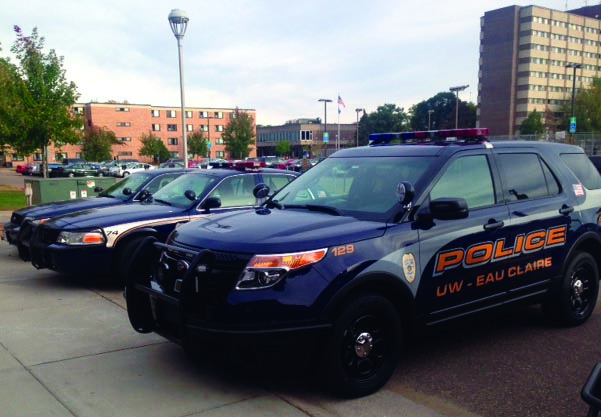Mass media’s role in policing
Eau Claire Police Department’s involvement in social media used to inform community
Photo by FILE PHOTO
October 1, 2015
The conversation about police brutality is spreading nationwide, but it isn’t just for the national stage — a local officer said fewer people are applying for officer positions and he wonders if it could be related to how the media portrays police officers.
Community Relations Officer Kyle Roder has been working with the Eau Claire Police Department for 13 years and said many non-traditional news outlets focus on getting a message out quickly instead of accurately.
“We’re jumping to conclusions on police shootings, police use of force, without knowing what it’s all about,” Roder said of some of the headlines.
In a presentation to a group of about a dozen students on Sept. 16, Roder described instances where media rushes to get a story out before the police department has a chance to make a public statement.
He said the recent protests against police wears on officers. In other areas, police officers have admitted hesitation to use force and have gotten hurt, Roder said.
Roder said this isn’t the case in Eau Claire, but recognized the danger of a hesitant officer.
“We’re trying to learn mental health, we’re trying to learn race relations, and cultural issues,“ Roder said. “… but we also have to respond to what we’re seeing.”
Regarding how police officers are portrayed in the news, Associate Director in the Multicultural Affairs Office at UW-Eau Claire, Charles Chou Vue, said the media usually chooses what they want to share with the public and sometimes the stories are not in the public’s best interest, but their own.
“This type of practice can be improved by having inclusive policies which will lead to more consistent, balanced and sincere news,” Vue said.
Black Student Alliance secretary and treasurer, senior Kiana Veal said, “There is often little to no interaction between black people and officers outside of the job. As a result, our perceptions of one another come from what the media shows us.”
The portrayals are often skewed, Veal said, causing the fear for each other both ways.
Sophomore Rachel Esselman said she thinks the media is both causing and perpetuating the problem.
“People need to become critical consumers of their news and other media outlets and try to see the underlying rhetorical strategies that are being utilized,” Esselman said.
History professor Selika Ducksworth-Lawton said the media has spread conflict. If stories of police brutality had been covered more in-depth and they acknowledged the U.S. Supreme Court’s role in ruling there would be less distrust.
“As long as we maintain training standards and respectful procedures and respectful protocol we’ll be fine here in Eau Claire,” Ducksworth-Lawton said.
Ducksworth-Lawton also said if officers are following procedures and protocol they should not need to worry about their use of force.
Likewise, sophomore Geoff Carter said “If there’s something or someone that could potentially harm citizens then it’s their (officers) job to prevent it.”
It’s important that police officers are able to show what they’re doing and have transparency through the use of social media and by being present at community events, Roder said.
Roder is responsible for managing the police department’s twitter account, which has received an international award for law enforcement in social media.
The twitter account updates the community about events, acknowledges the work of officers and informs followers with breaking news.
The account has been used to get news out to the public about a local shooting shortly after getting on scene, Roder said.
Roder referred to the President’s Task Force on 21st Century Policing. Of the six pillars, the third pillar titled “Technology and Social Media” suggests the use of technology and transparency in law enforcement can increase public trust in the community.
Ultimately, Ducksworth-Lawton said officers and the community need to come together to work toward solutions to the problem and responsible coverage on the media’s part can help in bringing actors together.
Junior criminal justice major Leah Wolff, who attended Roder’s presentation, wants to be a police officer. Wolff said she wasn’t intimidated by the realities Officer Roder shared about being a cop.
“It makes me want to do it even more,” Wolff said.
“My desire to be a cop has grown stronger,” Jonathan Schwede said in response to the way officers have been portrayed in media.
Schwede is the Vice President of the Criminal Justice Association and a criminal justice major interested in a career as a police officer.
Schwede said he chose the career because he wants to serve others and feels he could fulfill that best as a police officer.



